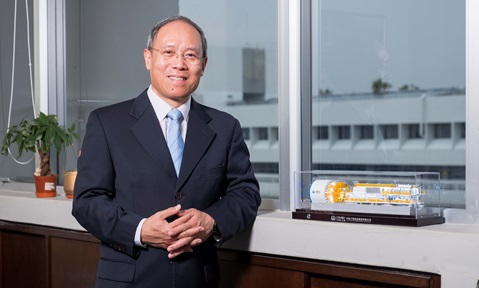Making an impact on climate change: Assoc Prof Edmond Lo
NTU Assoc Prof Edmond Lo models future risks of urban flooding caused by climate change and sinking ground to recommend mitigation measures.

From the lithosphere to the atmosphere, our warming climate affects our planet on multiple levels. It has dire consequences on human societies along coastal settlements, whose homes and livelihoods are threatened by rising sea levels and intensifying rainfall, both of which cause catastrophic flooding.
Thankfully, scientists such as Assoc Prof Edmond Lo of NTU’s School of Civil and Environmental Engineering are racing against time to find practical solutions that will allow us to respond to these threats. By simulating the effects of climate change, including risks of flooding, he is helping to mitigate future natural disasters and achieve resilience for communities in the region.
“I am working to understand the future risks of urban flooding caused by changes in climate and rainfall in the absence of mitigation efforts,” says Assoc Prof Lo, who simulates flood risks in Southeast Asian cities, in particular, Jakarta, Bangkok and Manila.
“Jakarta is a unique case as it is under a triple threat,” explains Assoc Prof Lo. “It’s prone to flooding from high tides and upstream rivers, and because the ground is subsiding.” In many coastal cities, the rate of sinking of the land is faster than the rate of global sea-level rise, he adds.
Tapping advanced satellite imagery and image processing to map large areas of the city, Assoc Prof Lo and his team are modelling the effects of increased rainfall and changed catchment characteristics—for instance, on riverine flow rates and flooded spaces—against the backdrop of Jakarta’s fast urbanisation rate.
“The next step will be to provide recommendations on how best to reduce the expected impact,” he says, such as the potential exposure of buildings and infrastructure as well as cost implications of flooding damage for each city.

In his role as Deputy Director of NTU’s Institute of Catastrophe Risk Management (ICRM), Assoc Prof Lo coordinates NTU’s research contributions in the multi-institutional research programme “Future Resilient Systems” under the Singapore-ETH Centre.
Now in its second phase, researchers in the programme study how critical infrastructure systems in urban cities behave under major failure events, and how they can be made more resilient. Assoc Prof Lo and his colleagues are particularly interested in cascading effects that arise from the interconnected infrastructure systems, which integrate computation, networks and physical processes influenced by human decision-making in complex ways. The programme is funded by Singapore’s National Research Foundation and led by the Swiss Federal Institute of Technology (ETH) in Zürich.
Having been Deputy Director of the Maritime Institute @ NTU—an institute within NTU driving maritime science and technology development—Assoc Prof Lo has spearheaded projects on maritime and port risks that draw on his background in hydrodynamics and wave mechanics.
He also led one of the first studies in Singapore looking into water behaviour when Singapore’s largest water catchment area and freshwater reservoir was created some 13 years ago with a dam built at the confluence of five rivers close to Singapore’s sea front.
“We studied, for example, how long it took after the dam was built for the previously brackish water in the reservoir to become fresh, and also other critical questions such as eutrophication, which happens if a body of water becomes overly enriched with nutrients leading to excessive algae growth,” he says.


.tmb-listing.jpg?Culture=en&sfvrsn=ab6472c8_1)
.tmb-listing.jpg?Culture=en&sfvrsn=55153609_1)



.tmb-listing.jpg?Culture=en&sfvrsn=b5366f51_1)